- Home
- Studs Terkel
Working
Working Read online
Table of Contents
Other Books by Studs Terkel
Title Page
Dedication
Acknowledgments
Epigraph
Foreword
Introduction
Preface
PREFACE II
PREFACE III
BOOK ONE
WORKING THE LAND
PIERCE WALKER
ROBERTO ACUNA
AUNT KATHERINE HAYNES
JOE AND SUSIE HAYNES
BOB SANDERS
HUB DILLARD
BOOK TWO
COMMUNICATIONS
SHARON ATKINS
FRANCES SWENSON
HEATHER LAMB
JACK HUNTER
A PECKING ORDER
TERRY MASON
BERYL SIMPSON
JILL TORRANCE
ANNE BOGAN
ROBERTA VICTOR
DID YOU EVER HEAR THE ONE ABOUT THE FARMER’S DAUGHTER ?
BARBARA HERRICK
THE COMMERCIAL
JOHN FORTUNE
ARNY FREEMAN
RIP TORN
EDDIE JAFFE
RICHARD MANN
ENID DU BOIS
BOOK THREE
CLEANING UP
NICK SALERNO
ROY SCHMIDT
LOUIS HAYWARD
LINCOLN JAMES
MAGGIE HOLMES
ERIC HOELLEN
WATCHING
FRITZ RITTER
VINCENT MAHER
RENAULT ROBINSON
ANTHONY RUGGIERO
JILL FREEDMAN
PAULINE KAEL
BOOK FOUR
THE DEMON LOVER
The Making
The Driving
The Parking
The Selling
BOOK FIVE
APPEARANCE
SAM MATURE
EDWARD AND HAZEL ZIMMER
JEAN STANLEY
DR. STEPHEN BARTLETT
DOC PRITCHARD
HOTS MICHAELS
TEDDY GRODOWSKI
TIM DEVLIN
COUNTING
NANCY ROGERS
FRED ROMAN
FOOTWORK
JACK SPIEGEL
ALICE WASHINGTON
JOHN FULLER
CONRAD SWIBEL
BRETT HAUSER
BABE SECOLI
THOMAS RUSH
GRACE CLEMENTS
DOLORES DANTE
JUST A HOUSEWIFE
THERESE CARTER
JESUSITA NOVARRO
BOOK SIX
THE QUIET LIFE
DONNA MURRAY
NINO GUIDICI
EUGENE RUSSELL
BROKERS
MARGARET RICHARDS
JAMES CARSON
DAVID REED GLOVER
RAY WAX
BUREAUCRACY
STEVE CARMICHAEL
LILITH REYNOLDS
DIANE WILSON
ORGANIZER
BILL TALCOTT
BOOK SEVEN
THE SPORTING LIFE
EDDIE ARROYO
STEVE HAMILTON
BLACKIE MASON
JEANNE DOUGLAS
ERIC NESTERENKO
GEORGE ALLEN
IN CHARGE
WARD QUAAL
DAVE BENDER
ERNEST BRADSHAW
PETER KEELEY
LOIS KEELEY NOVAK
LARRY ROSS
MA AND PA COURAGE
GEORGE AND IRENE BREWER
REFLECTIONS ON IDLENESS AND RETIREMENT
BARBARA TERWILLIGER
BILL NORWORTH
JOE ZMUDA
BOOK EIGHT
THE AGE OF CHARLIE BLOSSOM
CHARLIE BLOSSOM
STEVEN SIMONYI-GINDELE
TOM McCOY
RALPH WERNER
BUD FREEMAN
KEN BROWN
KAY STEPKIN
CATHLEEN MORAN
CRADLE TO THE GRAVE
RUTH LINDSTROM
ROSE HOFFMAN
PAT ZIMMERMAN
KITTY SCANLAN
BETSY DE LACY
CARMELITA LESTER
HERBERT BACH
ELMER RUIZ
BOOK NINE
THE QUIZ KID AND THE CARPENTER
BRUCE FLETCHER
NICK LINDSAY
IN SEARCH OF A CALLING
NORA WATSON
WALTER LUNDQUIST
REBECCA SWEENEY
SECOND CHANCE
FRED RINGLEY
PHILIP DA VINCI
SARAH HOUGHTON
MARIO ANICHINI
FATHERS AND SONS
GLENN STRIBLING
DAVE STRIBLING
STEVE DUBI
FATHER LEONARD DUBI
JACK CURRIER
HAROLD PATRICK
BOB PATRICK
TOM PATRICK
Copyright Page
Other Books by Studs Terkel
American Dreams
Lost and Found
Division Street
America
Giants of Jazz
“The Good War”
An Oral History of World War II
Hard Times
An Oral History of the Great Depression
Hope Dies Last
Keeping the Faith in Troubled Times
My American Century
The Spectator
Talk About Movies and Plays with the People Who Make Them
Talking to Myself
A Memoir of My Times
Will the Circle Be Unbroken?
Reflections on Death, Rebirth, and Hunger for a Faith
For Jude Fawley; for Ida, who shares his vision; for Annie, who didn’t.
Acknowledgments
As in two previous works, Division Street: America and Hard Times, my benefactors were friends, acquaintances, and wayfaring strangers. A suggestion, a casual comment, a tip, a hunch: a collective thoughtfulness led to the making of this book.
Among these singularly unselfish scouts were: Marge Abraham, Joe Agrella, Marvin David, Lucy Fairbank, Lou Gilbert, De Witt Gilpin, Bill Gleason, Jake Green, Lois Greenberg, Pete Hamill, Denis Hamill, Noel Meriam, Sam Moore, Bill Moyers, John Mulhall, Bryce Nelson, Patricia O’Brien, Jessie Prosten, Al Raby, Kelly Sanders, Florence Scala, Ida Terkel, Anne Thurson, Warren Weaver, Steven Yahn, Beverly Younger, Connie Zonka, and Henry de Zutter.
For the third time, Cathy Zmuda transcribed hundreds of thousands of spoken words—perhaps millions in this instance—onto pages that sprang to life. Her constant good humor and perceptiveness were as rewarding to me as her astonishing technique. Nellie Gifford’s acute observations as a volunteer editor, at a time the manuscript was really gargantuan, helped immeasurably in cutting the lean from the fat. A perspective was offered by both that might otherwise have been missing.
My gratitude, too, to Nan Hardin, for her generosity of time and spirit, as a knowing guide during a memorable trip through Indiana and eastern Kentucky. My colleagues at radio station WFMT, notably Ray Nordstrand, Norman Pellegrini, and Lois Baum, were once again remarkably understanding and ingenious during my prolonged leaves of absence. I know I gave them a hard time, but theirs was truly grace under pressure.
Especially am I grateful to my editor, André Schiffrin, whose idea this was, as twice before. His insistence and quiet encouragement, especially during recurring moments of self-doubt, are evident in all these pages. And to his nimble associates, Myriam Portnoy and Dian Smith, for their bright-eyed look at what was becoming burdensome matter—a salute.
Every man’s work shall be made manifest: for the day shall declare it, because it shall be revealed by fire; and the fire shall try every man’s work of what sort it is.
—
I Corinthians 3:13
You can’t eat for eight hours a day nor drink for eight hours a day nor make love for eight hours a day—all you can do for eight hours is work. Which is the reason why man makes himself and everybody else so miserable and unhappy.
—William Faulkner
The “work ethic” holds that labor is good in itself; that a man or woman becomes a better person by virtue of the act of working. America’s competitive spirit, the “work ethic” of this people, is alive and well on Labor Day, 1971.
—Richard M. Nixon
I like my job and am good at it, but it sure grinds me down sometimes, and the last thing I need to take home is a headache.
—TV commercial for Anacin
FOREWORD
Babe Secoli, a supermarket checker for nearly thirty years, is proud of her dexterity in moving items along the conveyor belt. If asked, she will do a little dance, showing how she hits the keys on the cash register with one hand, pushes the food along with the other and intermittently whacks the conveyor-belt button with her hip. She knows what everything costs—the price list on the register is, she says, only “for the part-time girl.” Almost everything amuses her, especially the rich ladies who drop in to shoplift meat. “I’m a couple of days away,” she says, “I’m very lonesome for this place.”
Ms. Secoli’s is one of the dozens of throaty, acerbic voices in Working, Studs Terkel’s oral history of working life, which was published thirty years ago this spring. When it appeared, Working was a revelation, a window on the thoughts of Americans who were rarely heard from: hospital aides, skycaps, gravediggers. Many of the interviews follow a similar, surprising trajectory, beginning with mundane workplace details but quickly moving on to existential thoughts. Even for the lowliest laborers, Mr. Terkel found, work was a search, sometimes successful, sometimes not, “for daily meaning as well as daily bread.”
The oral histories in Working are wistful dispatches from a distant era. The early. 1970s were the waning days of the old economy, when modern management practices and computers were just beginning to transform the American workplace. In the last thirty years, productivity has soared, but job satisfaction has plummeted. It is hard to read Working without thinking about what has gone wrong in the workplace.
Mr. Terkel’s ragtag collection of little-guy monologues was a runaway bestseller. Part of its appeal was the unusual, occasionally illicit glimpses it offered into the ways of the world. “If you work nights and it’s real quiet, I don’t think there’s an operator who hasn’t listened in on calls,” a switchboard operator says. “The night goes faster.” A gas-meter reader tells of the codes meter men put on customer cards when there was an attractive woman in the house.
Mr. Terkel’s interlocutors also offer deeper insights. A parking lot attendant holds forth on why working people are better tippers than Cadillac drivers. A prostitute reflects that she was “the kind of hustler who received money for favors granted,” not the kind who “signs a lifetime contract for her trick,” or who “carefully reads women’s magazines and learns what it is proper to give for each date, depending on how much. . . [he] spends on her.”
It is striking how many of Mr. Terkel’s subjects have found the meaning he says they are looking for. “Obviously I don’t make much money,” a bookbinder says, but she still loves repairing old books because “a book is a life.” A gravedigger recalls how impressed a visiting sewer digger was with his neat lines and square edges. “A human body is goin’ into this grave,” he says proudly. “That’s why you need skill when you’re gonna dig a grave.”
There are disgruntled workers in Working who feel caged in by their jobs, but many others exult in their ability to demonstrate their competence, to show off their personality and to perform. “When I put the plate down, you don’t hear a sound,” a waitress says. “If I drop a fork, there is a certain way I pick it up. I know they can see how delicately I do it. I’m on stage.”
The 1970s were a slower age, and much of the workers’ pleasure in their jobs is related to the less-demanding time clock. A hospital billing agent can take time off from dunning patients to look in on a man whose leg was amputated, who has no one to care for him. “If he’s going to live in a third-floor flat and he doesn’t have anybody home, this bothers me,” she says. A stewardess says she is supposed to spend a half-hour on a Boston to Los Angeles flight socializing with passengers.
Three decades later, we are caught up in what a recent book dubbed “The New Ruthless Economy.” High tech and new management styles put workers on what the author Simon Head calls “digital assembly lines” with little room for creativity or independent thought. As much as 4 percent of the work force is now employed in call centers, reading canned scripts and being supervised with methods known as “management by stress.” Doctors defer to managed-care administrators and practice speed medicine: in 1997, they spent an average of eight minutes talking to a patient, less than half the time they spent a decade earlier.
It is much the same in other fields. There have been substantial productivity gains. But those gains have not found their way to paychecks. In a recent two-and-a-half-year period, corporate profits surged 87 percent, while wages rose just 4.5 percent. Not surprisingly, a study last fall by the Conference Board found that less than 49 percent of workers were satisfied with their jobs, down from 59 percent in 1995.
When Working was written, these trends were just visible on the horizon. A neighborhood druggist laments “the corner drugstore, that’s kinda fadin’ now,” because little shops like his can’t compete. “Most of us, like the assembly line worker, have jobs that are too small for our spirit,” an editor says. “Jobs are not big enough for people.”
When America begins to pay attention to its unhappy work force—and eventually, it must—Working will still provide important insights, with its path-breaking exploration of what Mr. Terkel described as “the extraordinary dreams of ordinary people.”
—Adam Cohen
INTRODUCTION
This book, being about work, is, by its very nature, about violence—to the spirit as well as to the body. It is about ulcers as well as accidents, about shouting matches as well as fistfights, about nervous breakdowns as well as kicking the dog around. It is, above all (or beneath all), about daily humiliations. To survive the day is triumph enough for the walking wounded among the great many of us.
The scars, psychic as well as physical, brought home to the suppér table and the TV set, may have touched, malignantly, the soul of our society. More or less. (“More or less,” that most ambiguous of phrases, pervades many of the conversations that comprise this book, reflecting, perhaps, an ambiguity of attitude toward The Job. Something more than Orwellian acceptance, something less than Luddite sabotage. Often the two impulses are fused in the same person.)
It is about a search, too, for daily meaning as well as daily bread, for recognition as well as cash, for astonishment rather than torpor; in short, for a sort of life rather than a Monday through Friday sort of dying. Perhaps immortality, too, is part of the quest. To be remembered was the wish, spoken and unspoken, of the heroes and heroines of this book.
There are, of course, the happy few who find a savor in their daily job: the Indiana stonemason, who looks upon his work and sees that it is good; the Chicago piano tuner, who seeks and finds the sound that delights; the bookbinder, who saves a piece of history; the Brooklyn fireman, who saves a piece of life . . . But don’t these satisfactions, like Jude’s hunger for knowledge, tell us more about the person than about his task? Perhaps. Nonetheless, there is a common attribute here: a meaning to their work well over and beyond the reward of the paycheck.
For the many, there is a hardly concealed discontent. The blue-collar blues is no more bitterly sung than the white-collar moan. “I’m a machine,” says the spot-welder. “I’m caged,” says the bank teller, and echoes the hotel clerk. “I’m a mule,” says the steelworker. “A monkey can do what I do,” says the receptionist. “
I’m less than a farm implement,” says the migrant worker. “I’m an object,” says the high-fashion model. Blue collar and white call upon the identical phrase: “I’m a robot.” “There is nothing to talk about,” the young accountant despairingly enunciates. It was some time ago that John Henry sang, “A man ain’t nothin’ but a man.” The hard, unromantic fact is: he died with his hammer in his hand, while the machine pumped on. Nonetheless, he found immortality. He is remembered.
As the automated pace of our daily jobs wipes out name and face—and, in many instances, feeling—there is a sacrilegeous question being asked these days. To earn one’s bread by the sweat of one’s brow has always been the lot of mankind. At least, ever since Eden’s slothful couple was served with an eviction notice. The scriptural precept was never doubted, not out loud. No matter how demeaning the task, no matter how it dulls the senses and breaks the spirit, one must work. Or else.
Lately there has been a questioning of this “work ethic,” especially by the young. Strangely enough, it has touched off profound grievances in others, hithero devout, silent, and anonymous. Unexpected precincts are being heard from in a show of discontent. Communiques from the assembly line are frequent and alarming: absenteeism. On the evening bus, the tense, pinched faces of young file clerks and elderly secretaries tell us more than we care to know. On the expressways, middle management men pose without grace behind their wheels as they flee city and job.
There are other means of showing it, too. Inchoately, sullenly, it appears in slovenly work, in the put-down of craftsmanship. A farm equipment worker in Moline complains that the careless worker who turns out more that is bad is better regarded than the careful craftsman who turns out less that is good. The first is an ally of the Gross National Product. The other is a threat to it, a kook—and the sooner he is penalized the better. Why, in these circumstances, should a man work with care? Pride does indeed precede the fall.

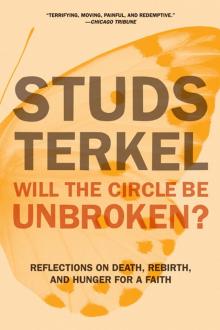 Will the Circle Be Unbroken?
Will the Circle Be Unbroken?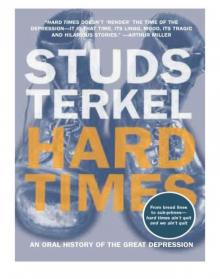 Hard Times
Hard Times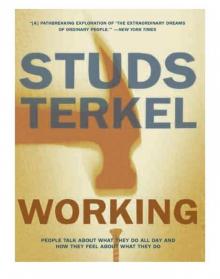 Working
Working Touch and Go
Touch and Go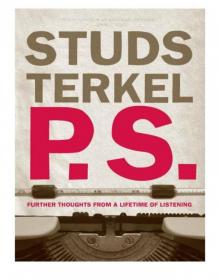 P.S.
P.S.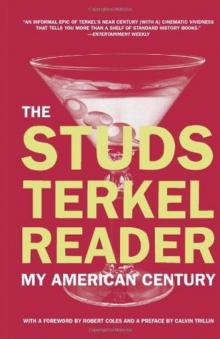 The Studs Terkel Reader_My American Century
The Studs Terkel Reader_My American Century